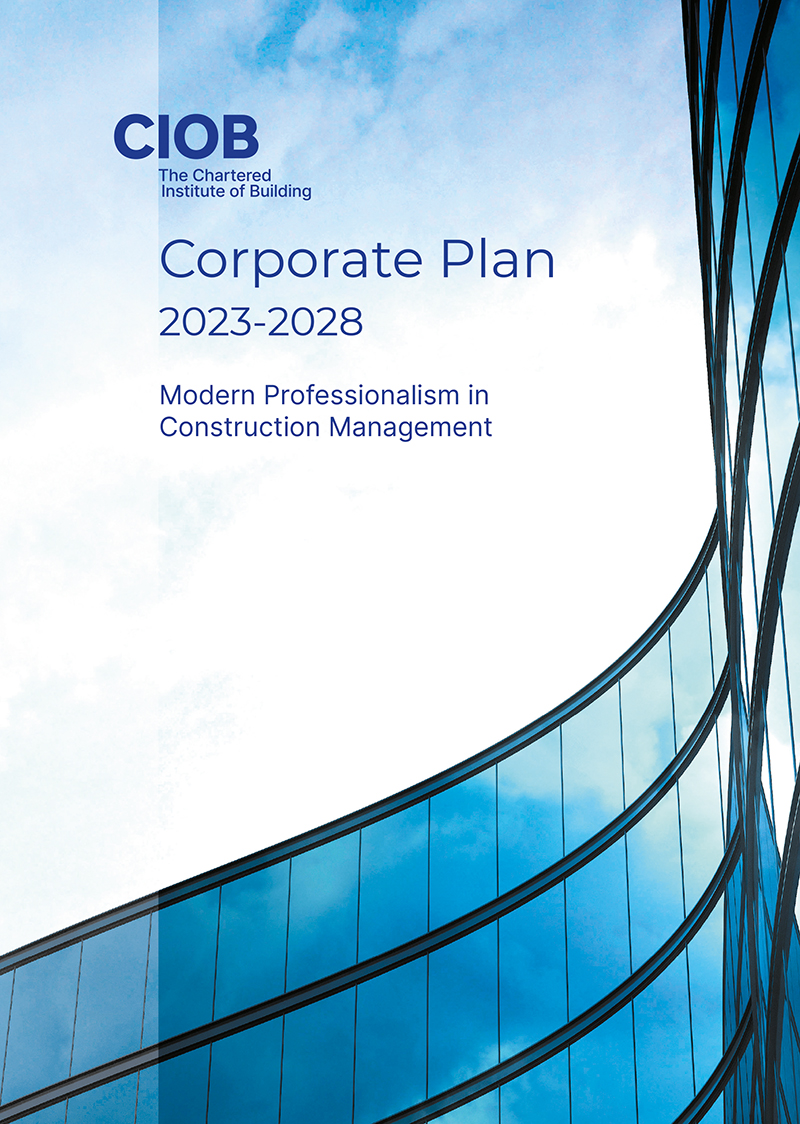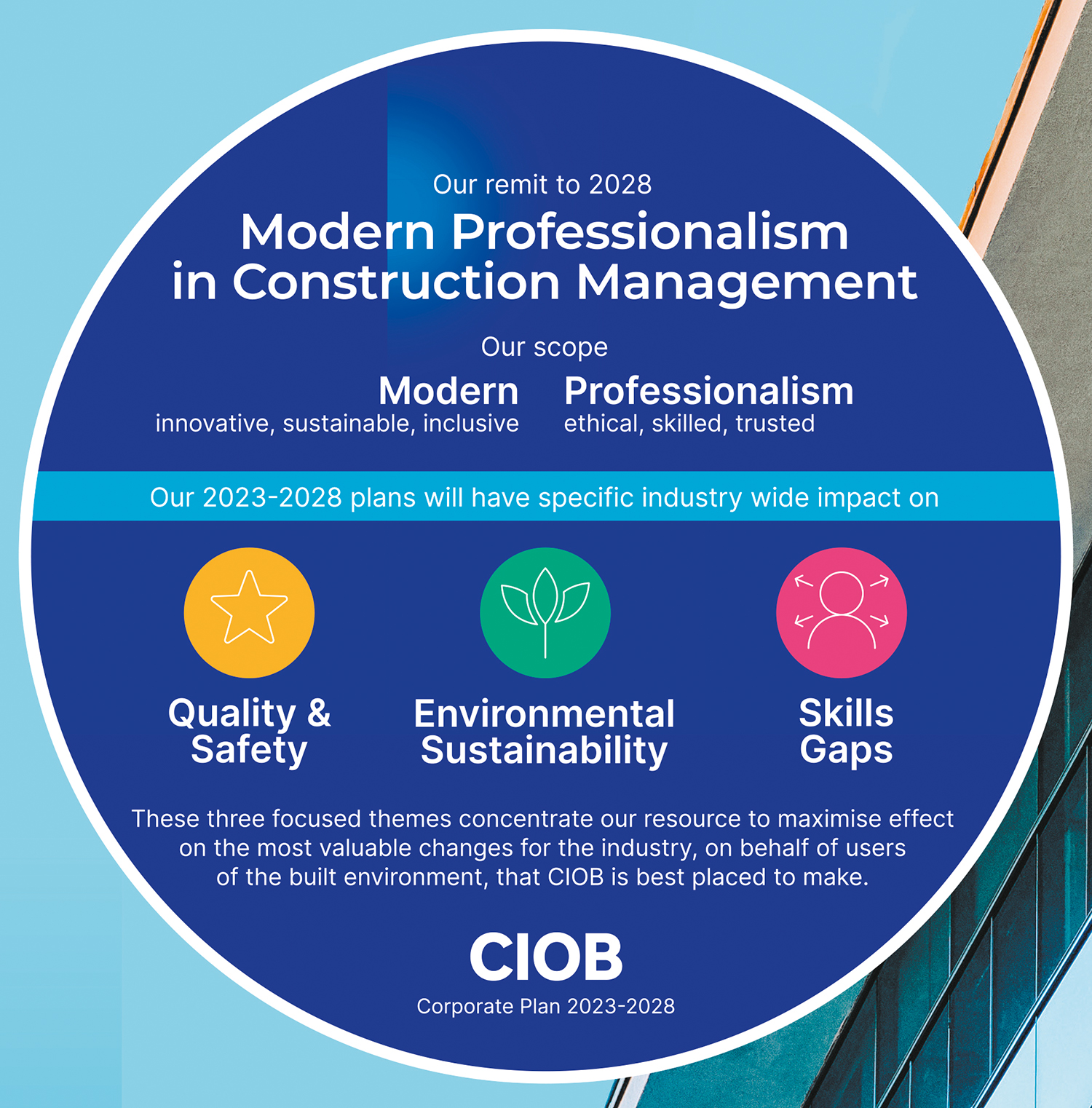
The CIOB Corporate Plan for 2023 to 2028 sets out a new course for members and the wider construction industry. Will Mann hears from CEO Caroline Gumble, chair of trustees, Steve Nitman, and president Michael Yam about the thinking.

The moral compass that will guide CIOB and its members over the next five years and beyond is here. The CIOB Corporate Plan for 2023-2028 provides, as CEO Caroline Gumble puts it, “a route map on a long-term journey, and the next five years are the first steps of that journey”.
The plan seeks to “elevate” the construction industry so that it becomes – literally and figuratively – a foundation for society and for communities around the world.
“We are here for public benefit,” Gumble says, “and the three focused themes we’ve selected for the plan – quality and safety, environmental sustainability, the skills gap – are the building blocks of that.
“Overarching all the themes is what we’re calling ‘modern professionalism in construction management’. That means setting standards, behaving ethically, offering leadership – unlocking the potential of individuals, teams, the wider industry.”
Tight focus
CIOB has purposely given the plan a tight focus. “We can’t do everything, and we felt it was important to pick issues where we were strong, where we could be relevant and make the greatest impact,” explains Steve Nitman, chair of CIOB’s board of trustees and commercial manager with Willmott Dixon.
“For example, CIOB and its members have already contributed to the work on building safety through our own quality commission, which started from Grenfell. We’re addressing the skills gap through the EDI charter. We were part of the CIC’s Climate Change Panel at COP26.”

Unlike the previous three-year edition, this Corporate Plan runs for five years, which its authors feel is a statement of its ambition.
“We believe the 48,000 CIOB members, operating in more than 100 countries across the globe, have the depth and breadth of experience and expertise to deliver the aspirations in the plan,” says current president Michael Yam.
Creating the plan
Work on the plan has involved extensive research and member engagement. “It was obvious to me that we needed to work with people who are new to the construction community,” explains Gumble. “There is a wealth of enthusiasm, knowledge, commitment and energy around our global membership from people who have recently joined the sector, which I wanted to tap into and engage with.
“We set up the ‘2030 Vision Group’ and tasked them with telling us what the construction sector would look like in 2030, or what it needed to look like. This working group of six people reached out to CIOB hubs around the world – so this is truly a global strategy – and came up with the three main themes that have gone into the plan.”
The plan has been tested across a wide spectrum of the membership, explains Yam. “The priority themes identified are not only relevant for the UK but across the global markets CIOB members operate in,” he says.
“The regulatory environment varies greatly between one country and another. However, the many countries in which CIOB members are present do encounter the same common struggle of meeting the desired quality and safety, sustainability and skills outcomes.”
Member representatives from around the world will now take local ownership, says Gumble. “There are some areas where it makes sense for hubs to localise the plan, for example in America, concerning the skills gap. But CIOB will retain the umbrella strategy.”
Impact on society
One word that crops up repeatedly in the plan is ‘society’. As the plan notes, “the construction industry has made huge contributions to society, [but] it has also created and contributed to serious issues”, with “pressing issues around quality, sustainability, trust and responsibility”.

“As a society, we love bad news – stories about poor workmanship, mould inside homes, leaking roofs,” Gumble says. “There are unscrupulous people who do poor quality work and I hope they are in the minority in our industry.
“But there are good news stories. There are construction companies who are looking after their staff, creating an inclusive environment from an EDI perspective, investing in innovation, taking quality and safety seriously – and these companies are thriving. They find work, they don’t find it difficult to hire and retain people. The successful companies are the ones generally doing the right things.”
Gumble wants society to value modern construction professionals more highly. And this means turning the spotlight on CPD. “If you visited your doctor and they told you they had not updated their skills for the last 20 years, you are going to feel a bit nervous!” she says.
CPD on steroids
“Among CIOB members, the mandatory CPD has always been there, but we’ve put it on steroids. We are focusing on key areas where members should have their skills up to date, such as ethics. If you are not taking quality and safety seriously, how can you possibly be doing your job properly?
“We want to create more expectation among clients and across society that qualified professionals should be working on construction projects.”
This is where Gumble believes CIOB’s client engagement strategy is crucial. “If we can help clients understand the benefits of engaging with qualified construction professionals, then our members will see the sense in investing in their own development,” she says.
“And all the themes of our plan are important to clients. We’re encouraging them to look at how they value their projects, not just about quality, but innovation and the whole life cycle, from design through to repurposing or deconstruction of the building. Thinking in the long term, not about the financial short term.

“When I am out meeting clients, the government, policy influencers, I sell the importance of working with professionals who are up to speed with issues like EDI, safety and sustainability, who are looking at new innovations, new practices, new materials, and I give a shout-out to those companies and individuals who already do that.”
Rolling the plan out and reinforcing its messages is now the focus. “A silver lining from the pandemic was the rise of online collaboration, which has made it easier for us to share information,” says Gumble. “We can now deliver CPDs on a global stage, where we can bring together speakers on any topic, accelerating the speed of collective learning.”
Challenge for smaller organisations
Nitman acknowledges that the step-up may be a challenge among members in smaller organisations.

“But we are creating more cost-effective pathways to professionalism for people who work in SMEs,” he says. “That includes online training – small companies don’t like to lose their staff from site for a full day. We can break the learning down into bite-sized chunks. CIOB offers a mentoring service to connect experienced members with someone just starting out on their journey to professionalism.
“We know we have a lot of members at small companies across the industry and we recognise that we need to bring them along on this journey too. However, SMEs do have a responsibility to deliver high quality work as well.”
Nitman expects the next five years “will throw up new challenges that we have not foreseen” but has “every confidence” that the plan can and will adapt. “I look forward to watching our ambitions for this important industry be delivered by modern professionals across the built environment,” he says.
Yam adds: “There is a long road ahead, but the plan provides a blueprint for collaboration, leading, knowledge-sharing and modernising professionalism which hopefully will be adopted by the wider industry.”
And Gumble concludes: “The Corporate Plan will be central to my tenure as CEO, but the work we are doing will not end after five years: it’s not a destination, it’s the start of a journey.”
Comments
Comments are closed.












This is a forward thinking venture. Your consideration of the SME companies is a grate idear and am sure this plane will evolve a positive change in the area of quality, safety, sustainaning our environment for future generation and filling gaps in skills shortages .